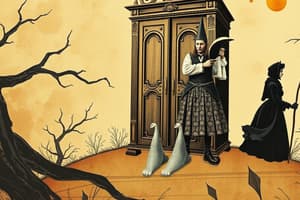Podcast
Questions and Answers
What are the primary functions of a wardrobe?
What are the primary functions of a wardrobe?
To organize and protect clothing from damage and dust.
Describe the differences between freestanding and built-in wardrobes.
Describe the differences between freestanding and built-in wardrobes.
Freestanding wardrobes are movable and come in various designs, while built-in wardrobes are customized to fit specific spaces.
What materials are commonly used to construct wardrobes?
What materials are commonly used to construct wardrobes?
Wardrobes are commonly made from wood, MDF, metal, or a combination of these materials.
How can one effectively organize a wardrobe for easy access to clothing?
How can one effectively organize a wardrobe for easy access to clothing?
What cultural significance does a wardrobe hold?
What cultural significance does a wardrobe hold?
Study Notes
Definition
- A wardrobe is a large, tall cabinet used for storing clothes and personal items.
Functions
- Organizes and protects clothing from damage and dust.
- Often includes shelves, drawers, and hanging space.
Types of Wardrobes
-
Freestanding Wardrobes
- Independent, movable units.
- Can vary in design and size.
-
Built-in Wardrobes
- Customized to fit specific spaces.
- Maximizes storage in bedrooms or dressing areas.
-
Sliding Door Wardrobes
- Features sliding doors for space efficiency.
- Popular in modern designs.
-
Open Wardrobes
- No doors; items are visible.
- Offers easy access but requires good organization.
Materials
- Commonly made from wood, MDF, metal, or a combination.
- Finishes can range from painted to natural wood.
Features
- Hanging Rods: For dresses and coats.
- Shelves: For folded garments and accessories.
- Drawers: For lingerie, socks, and small items.
- Mirrors: Often included in built-in designs.
Organization Tips
- Use matching hangers for a uniform look.
- Sort clothing by type (e.g., pants, shirts) or color for easy access.
- Utilize storage boxes or bins for seasonal items or less frequently used clothing.
Cultural Significance
- Symbolizes social status and personal identity.
- Can reflect cultural traditions in clothing storage and display.
Maintenance
- Regularly declutter and donate unused items.
- Clean surfaces to prevent dust buildup.
- Ensure proper ventilation to avoid musty odors.
Wardrobe Functions
- Organizes and protects clothing
- Protects clothes from dust and damage
- Provides shelves, drawers, and hanging space
Wardrobe Types
- Freestanding - Independent units, movable, various designs and sizes
- Built-in- Customized, fits specific spaces, maximizes storage
- Sliding Door- Space-efficient, popular in modern designs
- Open - Easy access, requires good organization
Wardrobe Materials
- Wood, MDF, metal, or a combination
- Finishes include painted or natural wood
Wardrobe Features
- Hanging rods for clothes
- Shelves for folded clothes and accessories
- Drawers for lingerie, socks, and small items
- Mirrors often built in
Wardrobe Organization Tips
- Use matching hangers
- Sort clothes by type (e.g., pants, shirts) or color
- Utilize storage boxes or bins for seasonal or infrequently used clothing
Cultural Significance
- Represents social status and personal identity
- Reflects cultural traditions in clothes storage and display
Wardrobe Maintenance
- Regularly donate unused items
- Clean surfaces to prevent dust
- Ensure proper ventilation to avoid musty odors
Studying That Suits You
Use AI to generate personalized quizzes and flashcards to suit your learning preferences.
Description
This quiz explores the various types of wardrobes, their functions, and features. From freestanding to built-in designs, learn how wardrobes organize and protect clothing. Test your knowledge on materials, designs, and functionalities in this engaging quiz.




